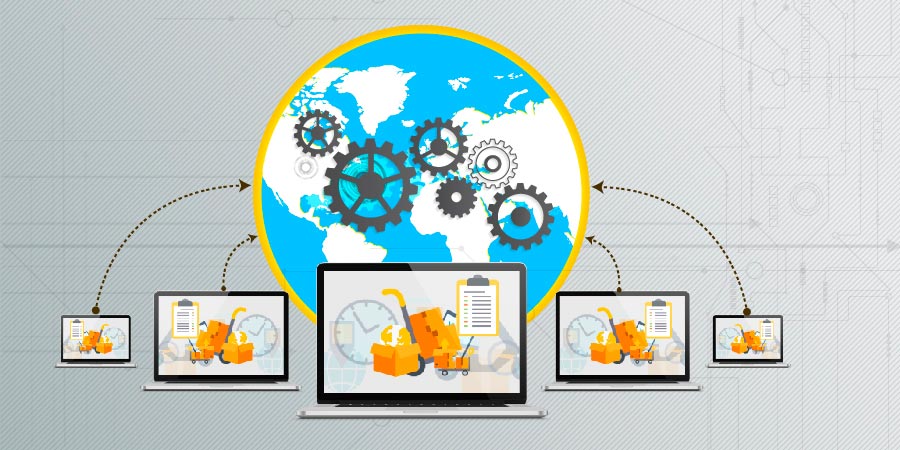
Sales strategy of every business today, works on one standard element – eCommerce. Companies both, B2B and B2C, are required to have mandatory online shopping feature on their sites to increase their market reach. There is nothing wrong in it. Having an online purchase option or placing the purchase order online on the manufacturer or distributor’s website paces up the process – across. It reduces the time taken for an online retail order to be picked, packed and handed over to the courier service or package courier.
Ecommerce businesses have realized that online shoppers not only need free shipping but also fast delivery and hence; have come a long way to meet customer requirements and expectations of order processing resulting in fast shipping. However; once the eCommerce business grows to a point where a manufacturer or a distributor can no longer pack and ship the order on their own – it’s time they consider outsourcing their order fulfillment.
Inflection & eCommerce industry
The kind of inflection that eCommerce industry is witnessing today is similar to something which happened in past; w.r.t. technology shifts responsible for revolutionizing web-based services and apps as well. Yahoo and a few more in the same capacity delivered search and low-end web apps which inflected the ways internet was used. Google and Facebook were smart enough to adapt and adopt the learnings from that change to introduce born-in-the-Internet apps, platforms, and services. The transformation that we are talking is the same which made Netflix to mail CDs in initial years, followed with cloud-based streaming these days; evicting Blockbuster and other players from the market.
Same is the case with eCommerce industry. Born-in-cloud eCommerce systems are picking up pace to dispose of conventional on premise systems in couple of years. Inflection is obviously evident in form of consistently improving customer experience, increased number of multi-tier distribution selling, advanced workflows and many more. All this development is it seems supporting Gartner’s (Need to Login with Gartner Account) prediction (client access reqd.) about eCommerce industry growing at a CAGR of over 15% across 2015-2020. This includes the revenue generated from SaaS, Licenses and maintenance as well.
Enlisted are a few more predictions made by some of the leading and best market research firms:
- 15% year-over-year increase is what worldwide spending on digital commerce platform attained, reaching to approximately $4.7B.
- By year 2018, 40% of B2B eCommerce sites, equipped with price optimization algorithms, will succeed in configuring, pricing and generating quotes to calculate and deliver dynamic product pricing.
- B2B eCommerce will go beyond $1.1 Trillion and will have a share of more than 12.1% of all B2B sales across US by 2020; says Forrester.
B2B eCommerce is likely to get twice as big as B2C by 2020
The spending on B2B eCommerce systems, services and platforms per say has doubled as compared to what B2C eCommerce spends. B2B e-Commerce market will grow to $1.1T compared to the B2C market at $480B, says Forrester.
Going by the report, there are two industries which are pumping most of the market growth – manufacturers and wholesalers. However; several of these manufacturers are still operating out of their conventional systems and failing miserably at delivering the experience which B2B buyers anticipate.
The rapidly transforming dynamics of distribution channels have succeeded in redefining distributor’s business models across products and services arena. Manufacturers and distributors are now required to get beyond competing on availability and low price. Instead they should channelize their efforts towards delivering customer experience which meets customer expectations. All these put together are driving B2B eCommerce market to grow in double digits through 2020.
Why B2B and B2C eCommerce players should outsource order fulfillment?
Till now we witnessed the humongous growth that B2B eCommerce is likely to attain. Do you really think it would be really feasible and possible for those dealers, distributors, manufacturers and all involved to manage the entire show on their own? In case they try and manage it, but with help of what, those same conventional order fulfillment systems? In case that also worked, but what is the guarantee that they will be delivering customer experience which B2B customers anticipate?
This is the reason why they should outsource order fulfillment. Expert at data extraction, data entry, data processing, document management and overall business process management are equipped with skills, infrastructure and experience of managing order processing for B2B eCommerce – seamlessly. They impact various stages of an order fulfillment process as enlisted:
Order entry for fulfillment service
1. Sending across fulfilled order, individual/bulk to the warehouse
2. Data entry of every individual order in the website or web based application of a fulfillment center
3. Sending an email with MS excel attachment, a list of all order once in a day
These are the three methods, and any one of it is usually adhered to. However; each of the above has its own positive and negative effect on your business.
- On one hand if you save a few dollars by manual entry of orders in a web-based app – but this proves to be a failure once your business grows to the extent where you have more orders to manage and less time to enter.
- You may decide to automatically email individual invoices to the warehouse and are ready to bear that extra cost; but this will work in your favor only if you have orders shipped, as and when they arrive; don’t forget that same day shipping can give you that edge over competition.
- For handling huge volumes of orders, you would not favor entering each order into the web based application, and also would not afford to pay extra dollars for emailing individual orders to the warehouse.
- Sending across a consolidated spreadsheet is fine in case you are ok with shipping the orders next day, but for that you need to look out for a warehouse which suits your business requirements and budgets.
While all this is been dealt with; getting associated with an expert outsourcing solutions provider will help you resolve such issues once and for all. Share your business needs with these innovative partners and they will help you with a few more aspects of your business; like you would have never thought before.
Inventory management
Inventory is where you store a wide plethora of quantity and variety of your goods – off site. These offshore partners based on their vast experience will assist you in streamlining the workflow of receiving and organizing your inventory. The shared credentials of the web based app that you have will help them to log in and update your inventory in a regular fashion and will help you log in and view the current status of stocks and history of every individual item.
Automatic order fulfillment
Fulfillment warehouses act on shipping requests received through web-based application, emails or spreadsheets.
If this article was written 4-5 years back, for automatic order fulfillment; we would have said that “Upon working with an outsourced order fulfillment solution provider for a couple of years, once they are well acquainted with your business and process needs – you can decide on handing over the entire order fulfillment process to them for automation.” However; today that is not the case. These third party order fulfillment experts grew their experience with time and now are in a position to deliver automatic order fulfillment solutions to manufacturers and distributors, as an outcome of the consultation sessions that are held between them for betterment of processes.



